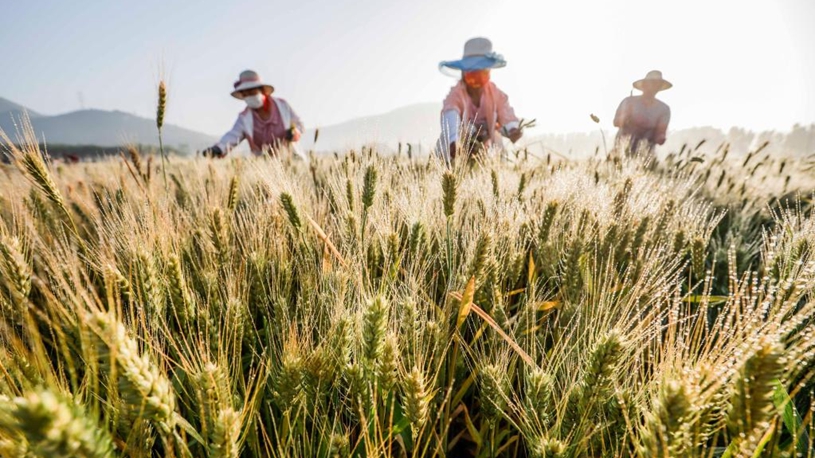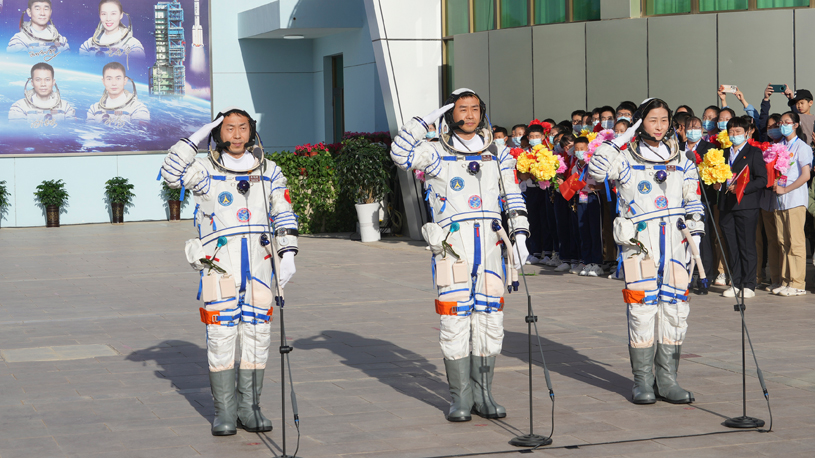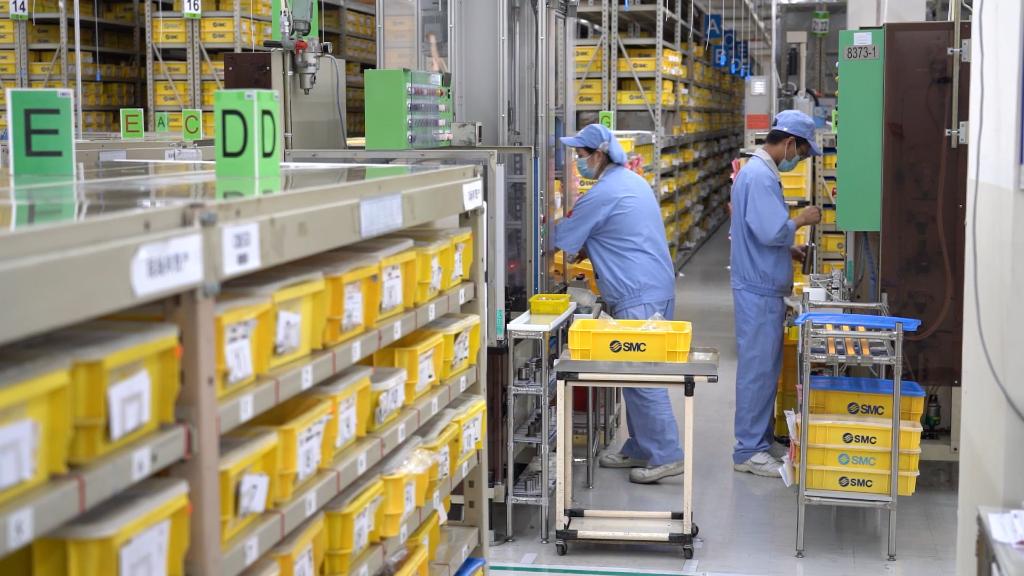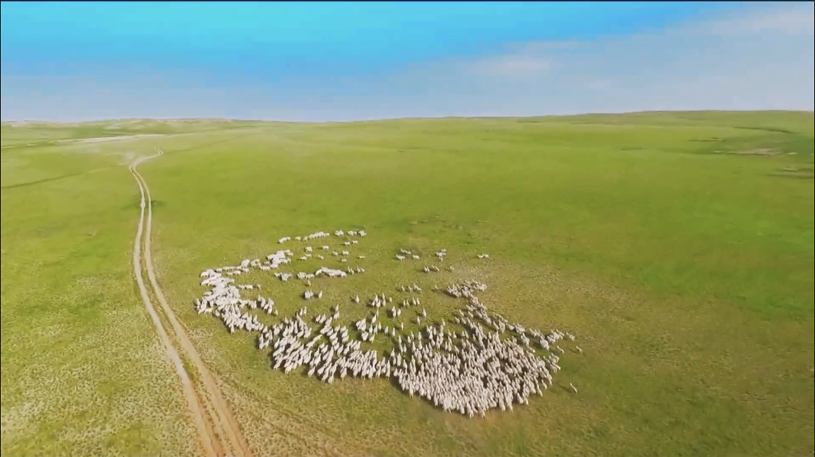* A record 11.93 million people have applied for this year's college entrance exam in China, known as the "gaokao," an increase of 1.15 million from 2021.
* Except for a postponement in Shanghai due to COVID-19, the exam kicked off Tuesday nationwide.
* Authorities across China have arranged more than one million proctors and other personnel in 330,000 ordinary exam rooms.
BEIJING, June 7 (Xinhua) -- After taking pictures with his family at the gate of Dacheng Middle School in Beijing, Wang Junkun had his temperature taken, showed his exam admission ticket, and walked into the school at 8:10 a.m. to take the annual college entrance exam in China.
Senior high candidates like Wang have spent most of the past three years studying at school while adapting to the impact of COVID-19, such as switching to online classes amid virus resurgences.
According to the Ministry of Education, a record 11.93 million people have applied for this year's exam, known as the "gaokao," an increase of 1.15 million from 2021. Except for a postponement in Shanghai due to COVID-19, the exam kicked off Tuesday nationwide.
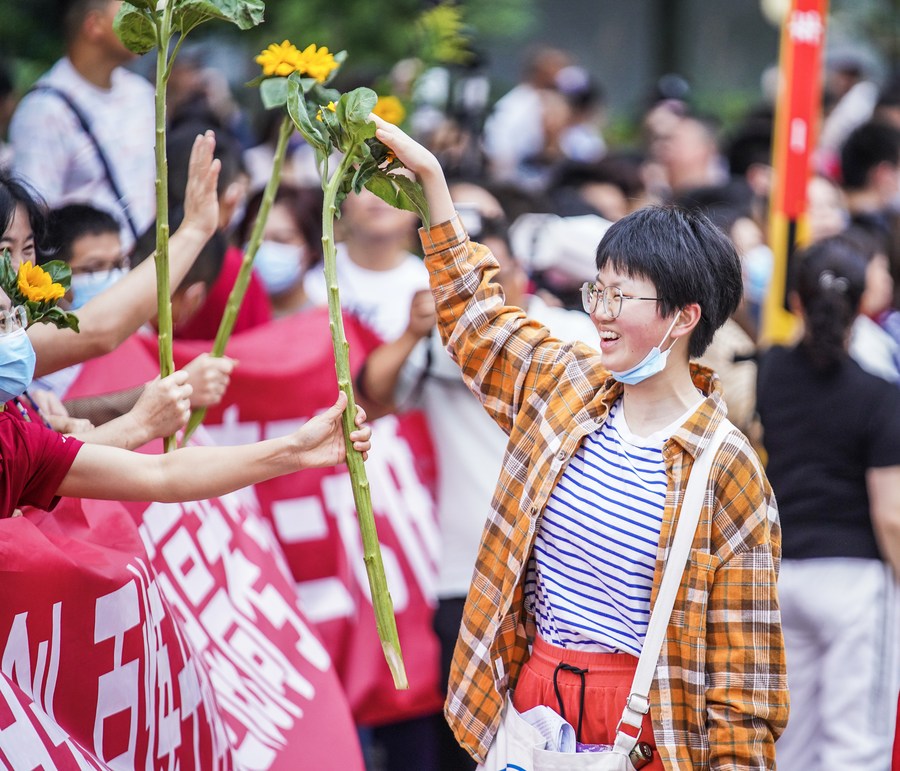
An examinee reacts with teachers at an exam site in Guiyang, southwest China's Guizhou Province, June 7, 2022. (Xinhua/Tao Liang)
EPIDEMIC PREVENTION
Authorities across China have arranged more than one million proctors and other personnel in 330,000 ordinary exam rooms, the ministry said.
Despite the waning epidemic situations in Shanghai, Beijing and other regions, such a massive-scale exam is still a test for organizers to ensure everyone's safety and health, as well as the smooth operation of the exam.
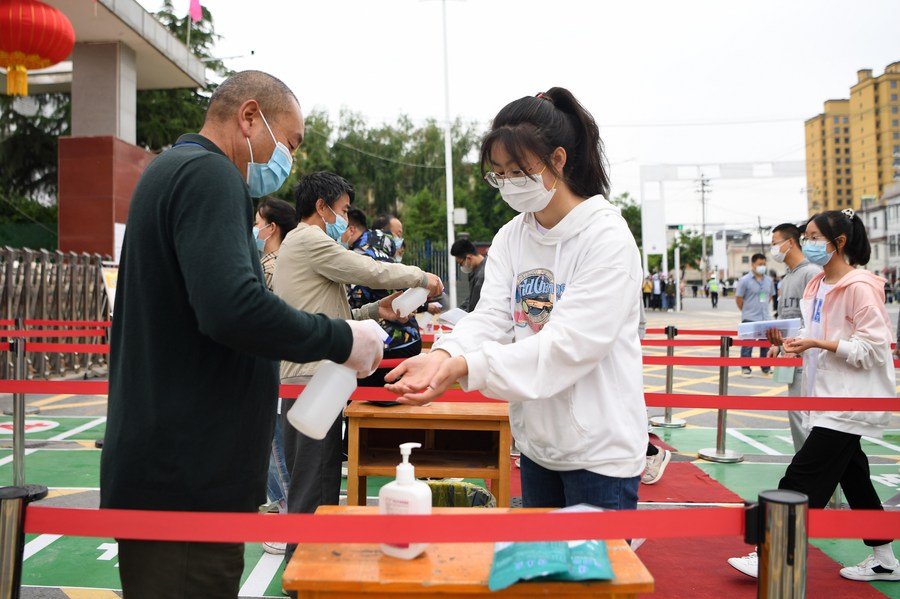
An examinee has her hands disinfected at an exam site in Zhangjiachuan Hui Autonomous County in Tianshui, northwest China's Gansu Province, June 7, 2022. (Xinhua/Chen Bin)
"About 54,000 students in Beijing will take the 2022 national college entrance exam. To ensure the safety of all participants, a list of COVID-19 prevention and control measures has been put in place. Exam rooms are also available for those in closed-off management areas," said Li Yi, a spokesperson for the Beijing Municipal Education Commission.
"The exam candidates I'm in charge of from a closed-off management area will take their exam in a hotel, with each student in a respective room," said Qin Lianzhi, a staff member at Beijing Ritan High School.
Qin noted that authorities have put in place schools desks familiar to students at the hotel to help the examinees relax.
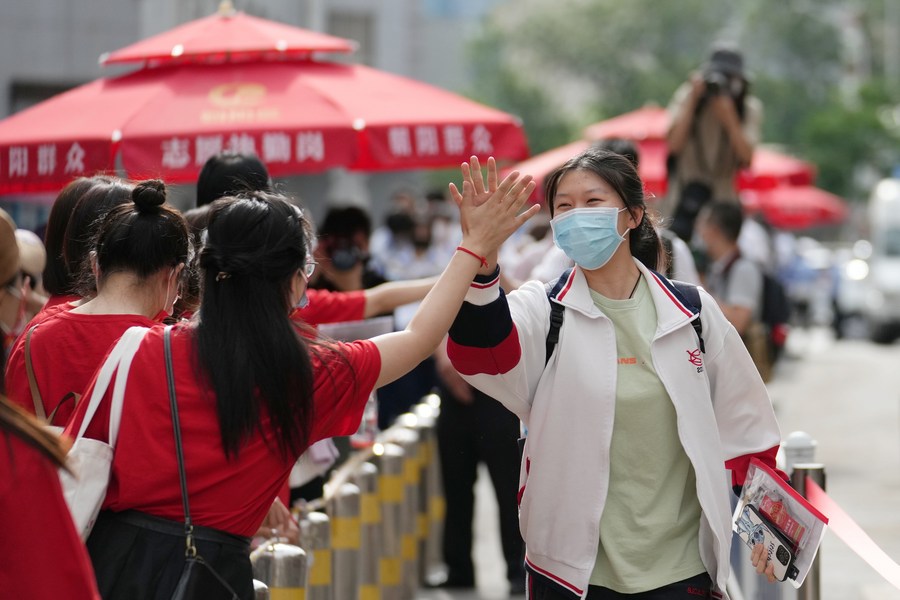
An examinee claps hands with her teacher at an exam site in Beijing, capital of China, June 7, 2022. (Xinhua/Ju Huanzong)
All proctors are required to be vaccinated, conduct 14-day health monitoring and show negative nucleic acid test results within 48 hours prior to the examination, Li said.
"In line with the COVID-19 countermeasures, teachers at exam sites are ready to provide academic assistance and psychological guidance for candidates. Parents and teachers can reach out with the best support for students facing one of the most important tests in their life," Li noted.
To make sure that the candidates are able to attend the exam as scheduled, a health information report system was set up about a month ago to record the related data of students and improve exam organizing conditions, according to the Beijing Municipal Education Commission.
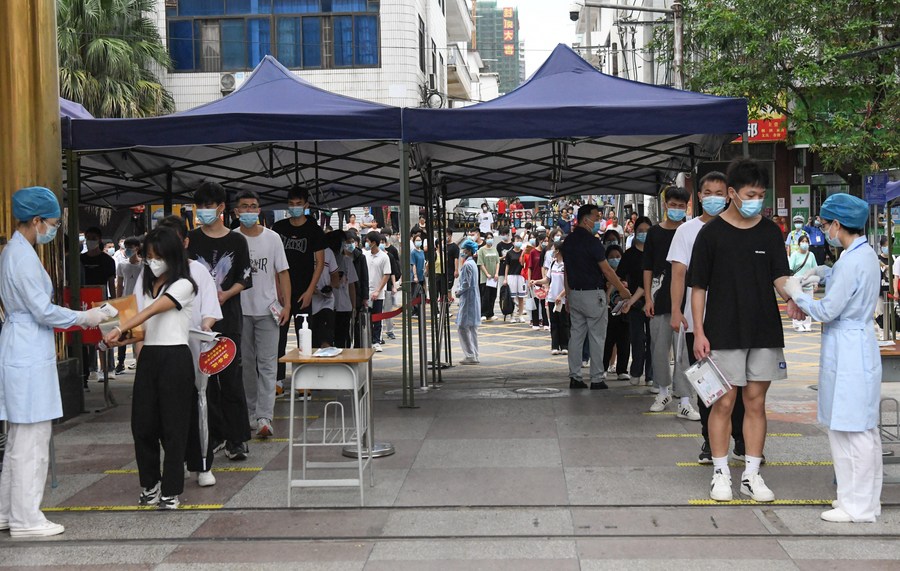
Examinees have their temperature checked at an exam site in Dahua Yao Autonomous County, south China's Guangxi Zhuang Autonomous Region, June 7, 2022. (Xinhua/Zhang Ailin)
Confronted with the interruption to exam preparation caused by the resurgence of the pandemic, some candidates lapsed into nervousness and anxiety, said Wang Yongbo, director of the children's mental health center in Shenyang, capital of northeast China's Liaoning Province.
"Mental health support has been offered by teachers at examination sites and psychological counseling at schools," said Shao Yingying, a teacher at Shenyang No.2 High School. "We have taken proper measures to help them relieve the pressure."
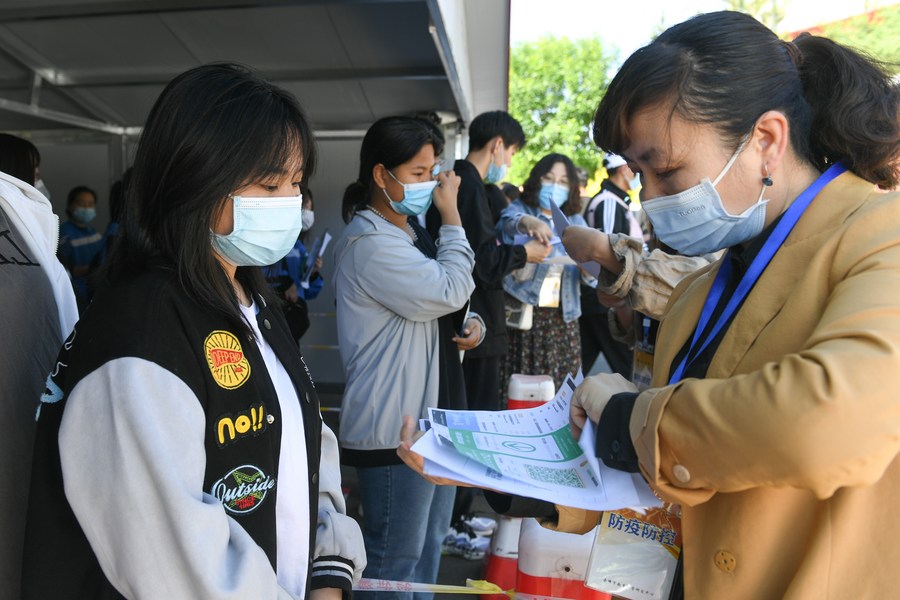
A staff member checks health code and nucleic acid test result of an examinee in Chifeng, north China's Inner Mongolia Autonomous Region, June 7, 2022. (Xinhua/Bei He)
CONVENIENCE FOR EXAMINEES
Subynur Abduweli, a Uygur student, is pleased that she can take the exam on her doorstep like 988 other candidates in Wushi County of northwest China's Xinjiang Uygur Autonomous Region.
Starting from 2020, authorities chose a local middle school as the exam site in Wushi County. Before that, examinees had to drive for about an hour and a half to the nearby city of Aksu 120 km away.
"For the sake of students, whose homes are scattered in the county, they have been arranged in the student dormitory opposite the exam site before the test, which is conducive to avoiding the occurrence of being late or forgetting to bring exam admission tickets or ID cards, said Tian Zhizhong, deputy head of the exam site.
During the exam, the police set up a "temporary ID card application point" at the gate of the school. Candidates who forget to bring their ID cards only need to tell their ID number to get a temporary one for entrance.
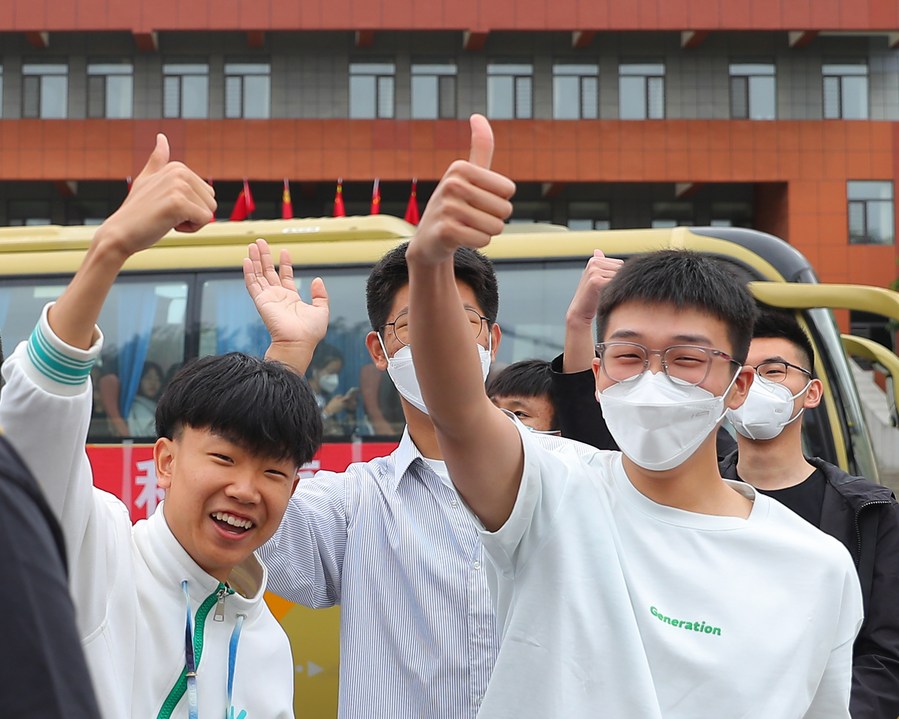
Examinees cheer for themselves at a high school in Shenyang, northeast China's Liaoning Province, June 7, 2022. (Xinhua/Yang Qing)
In Shenyang, more than 200 taxi drivers and some 100 driving instructors have volunteered to shuttle gaokao candidates from their dwelling places to examination sites, under the guidance of the civil affairs and transportation authorities.
All the volunteering taxi drivers tied a blue ribbon around the side mirrors of their cars so candidates can quickly and easily recognize them.
Li Yueyou, one of the taxi drivers, said that many volunteers, including himself, began to give examination candidates a lift free of charge a few years ago, and he witnessed the number of volunteers expand from a dozen to 253. ■
(Reporting by Zhao Jiasong, Huang Zechen, Wang Ying, Zhao Xu, Li Chunyu, Zhao Wanwei, Wei Mengjia and Gao Han; Video reporters: Sun Xiaoyu, Yang Siqi, Mi Yingting, Lin Kai, Liu Yuxuan, Liu Qinbing, Guo Jiewen, Pang Yuanyuan, Wang Pu and Ren Chao; Video editors: Zhu Cong, Yin Le and Peng Ying.)


